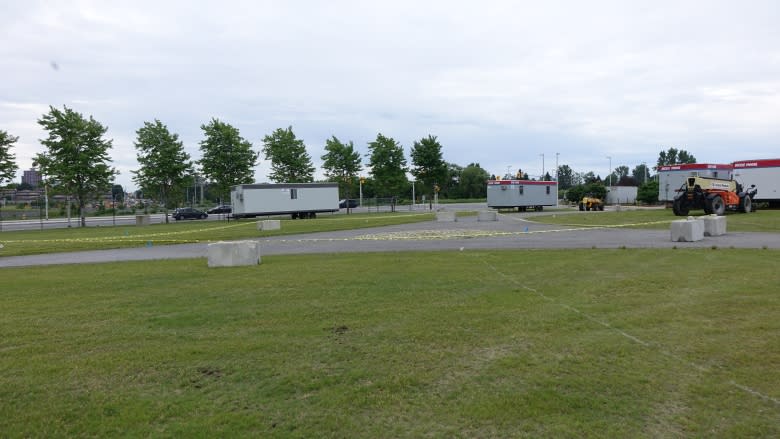Egg-stra bad timing: Bluesfest setup jeopardized by nesting bird
It's a tale of a tiny bird versus one of Ottawa's biggest outdoor festivals.
A killdeer is nesting right in the middle of the cobblestone area of a path where Bluesfest's main stage is set to be built.
"We all want to see the bird happy and healthy and have her eggs hatch," said Nate Graves, head of the crew at Bluesfest that's preparing to construct the stage.
"But if they don't hatch by Tuesday, there's going to be a bit of a problem."
Protecting 4 eggs
The festival doesn't get underway until July 5, but the setup work has already begun.
Graves said he came across the bird while walking on the cobblestones.
"I saw a bird about five feet away flapping its wings at me. So I backed away and then it ran off and pretended it had a broken wing," he said.
"I've seen that before. I knew it was protecting a nest. I looked [and saw] there's four eggs right where [the] main stage sits."
Workers have been trying not to interfere with the bird or scare her. Caution tape encircles an area around the cobblestones.
Graves said biologists and representatives from the National Capital Commission, which manages the land where the festival takes place, paid a visit Friday to examine the situation.
He said he's not sure what could happen in the next few days.
'Those eggs will be in trouble'
The NCC told CBC News it's been in contact with Bluesfest organizers and the federal Ministry of the Environment and Climate Change about the nesting killdeer.
No one from Bluesfest's head office was able to comment Saturday.
According to Michael Runtz, a naturalist and lecturer at Carleton University, the cobblestone path is the perfect place for the killdeer to build a nest.
"They just love to put their eggs on a gravelly base because their eggs are the colour of small stones. So they blend in very well with that kind of background," he said.
"[But] unless the eggs hatch before Bluesfest gets set up, those eggs will be in trouble."
Incubation typically takes between 24 and 26 days, but once they hatch, the birds are precocial, he said — meaning they'll be able to easily move away from the area and take care of themselves.
Can't simply move the nest
But until that happens, Runtz said, it's not so easy as just relocating the nest.
"Many birds will abandon a nest that's moved," he said, adding that the nest is actually more of an indentation in the gravel.
If the eggs are moved more than a metre away, Runtz doubted the parents would still accept them as their own.
Killdeers are relatively plentiful in Canada, being found in both rural and urban areas, Runtz said.
They are protected under the Migratory Birds Convention Act, which offers some protections to migratory birds' nesting grounds. Their population has seen at least a 50 per cent decline since 1970.
Killdeers have a highly distinctive call, and also put on a spectacular display if a predator approaches.
"They put their wings out, they flop around, they cry pathetically as if they were greatly injured, even having broken wings and they try to lead the animal away from the nest."
The festival runs from July 5-15.




